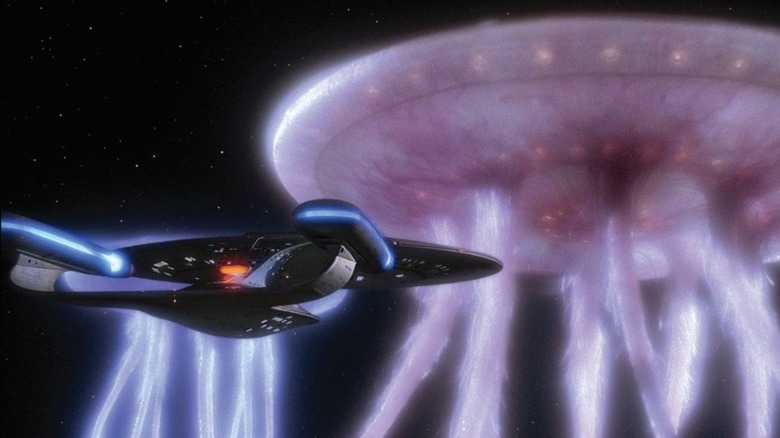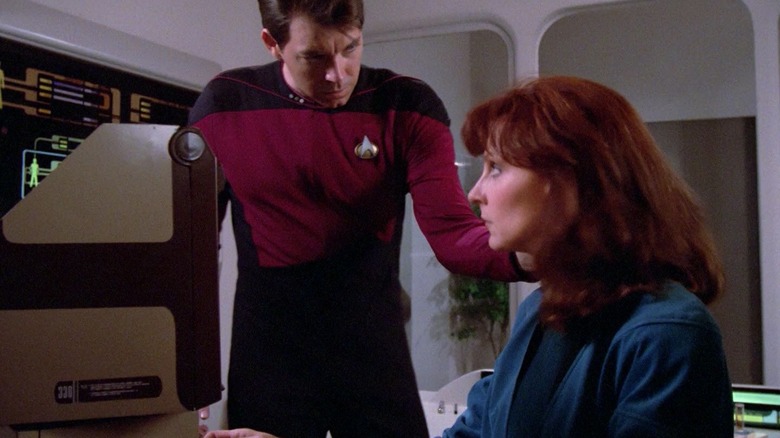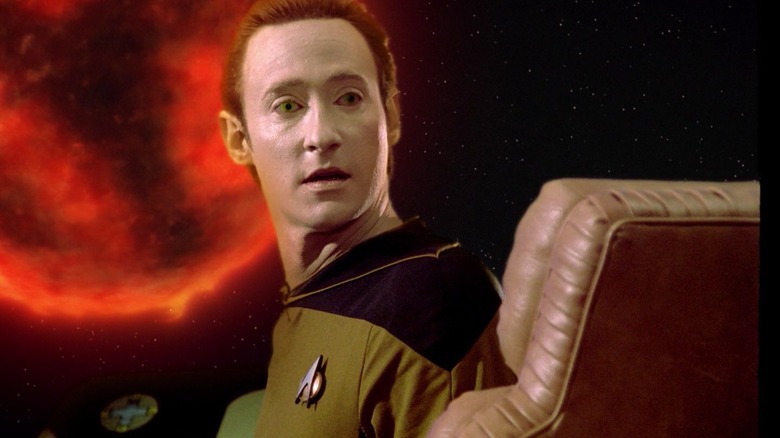The Music For Star Trek: TNG Was A Huge Source Of Tension Behind The Scenes
A fun piece of trivia: the theme music to "Star Trek: The Next Generation" is actually a wholly unoriginal piece of music. It is a combination of the opening strains of the original "Star Trek" theme song composed by Alexander Courage, and the main theme for "Star Trek: The Motion Picture" composed by Jerry Goldsmith. The "Next Generation" theme merely re-orchestrated the "TOS" and "TMP" scores a little bit. This wasn't always the plan, however. Dennis McCarthy, frequent composer for "Next Generation" (he worked on 88 episodes), wrote an alternate theme that was replaced at the last minute.
McCarthy also composed the score for "Encounter at Farpoint," the show's pilot episode. McCarthy's sound would come to define "Star Trek: The Next Generation" and dictate how other composers would move forward with the Paramount orchestra. Every Trekkie likely has, in their very DNA, the tense moment of suspense music that McCarthy so often used right before a commercial break.
McCarthy, however, did not conceive of that suspenseful music. That was Ron Jones, composer of 42 episodes of "Next Generation," including the celebrated score for "The Best of Both Worlds," the famous Borg episode. As he revealed in the invaluable oral history book "The Fifty-Year Mission: The Next 25 Years: From The Next Generation to J. J. Abrams," edited by Mark A. Altman and Edward Gross, Jones was working on the score for the show's second episode, "The Naked Now," before McCarthy completed his work on "Encounter at Farpoint." A lot of the more typical "Next Generation" musical cues began there.
Jones noted that, as the first composer, a lot of weight was on his shoulders. If his work was to serve as the series' central example, it needed to be just right, leading to multiple execs breathing down his neck.
The Naked Now
"The Naked Now" (October 5, 1987) was a sequel of sorts to the original series episode "The Naked Time." In both episodes, the Enterprise was infiltrated by an insidious virus that makes the infected behave like they're really drunk. Some characters are able to keep their cool, but most of them become uninhibited, horny, silly, and unable to perform their duties. Jones recalls scoring that episode in particular, as he was essentially still on probation. He noted:
"Dennis [McCarthy] did the pilot a week and a half after I did 'The Naked Now,' so I had all the pressure. I had all the gray suits from the executive offices at Paramount coming around and watching my every move. But after they figured out I knew what I was doing, I got to do pretty much whatever I wanted to the first year."
According to Lukas Kendall, the editor of Film Score Monthly, "Next Generation" executive producer Rick Berman had a very specific mandate for the "Next Generation" score, in that it should be unobtrusive and functional. He didn't want loud drums, syncopated rhythms, or scores that were unique to individual episodes. He wanted the music to stay the heck out of the way of the characters. Kendall opined that Berman's approach was actually musically boring, forcing the score to become the aural equivalent of technobabble. It communicates something, but it's kind of a place-filler.
This mandate was felt by Jones when he received notes to be "less dramatic" with his composing. He felt "Next Generation" could be more cinematic. The studio didn't necessarily want that.
Creatively different
Jones recalled:
"[T]here were all these indicators from on high that everything wasn't necessarily the way they wanted it to be. I felt ... at first that I was being guided very gently in certain ways, away from doing things more dramatically and being forced to mellow out. But I saw the episodes as needing certain things dramatically, and I tried to do what I could. I really saw the series more like a series of movies, and I thought people would appreciate that approach after we got done with the series. That they would sort of stand on their own more."
Kendall criticized Berman for his demands that the show's music be subtle to the point of being nondescript, largely because he clearly liked Jones' scores. He noted that Jones had "a death wish for bucking authority," and that he witnessed postproduction supervisors Peter Lauritson or Wendy Neuss remove anything from Jones' work that was too noticeable. Eventually, Jones was fired at the end of the fourth season of "Next Generation" for, essentially, being too iconoclastic.
Berman, meanwhile, wanted to set the record straight, defending his decision to fire Jones as a matter of nondescript creative differences. And, yes, he had heard the rumors that Kendall stated above. Berman said:
"I have read time and time again I fired Ron Jones because he was too good, his music called too much attention to himself, and I wanted mundane boring soap opera background kind of music. That's something that not only have I read — it's even been on my Wikipedia page! It's very far from the truth. Peter Lauritson was one of the most important people in 'Star Trek' and a person who gets very little attention. He selected all of the composers and I would approve them."
Berman's side of the story
Berman continued:
"We had numerous composers over the course of all of the years, with Dennis McCarthy being one of the two main composers. Ron Jones came in, he did a number of episodes for us. Both Peter and I, who worked very hard and had a hand in both selecting and deselecting composers, felt that Ron's music was not working for us. We didn't have to necessarily explain ourselves."
Berman, however, did admit that some of the reports of his demands were true. He did indeed want more nondescript music and preferred composers who could provide something functional over composers who wanted to try something unique. Berman feels that his demand was blown out of proportion and that he was not a bad guy for firing a talented musician like Jones:
"I could say that there were times where it called attention to itself a little bit too much. That was one thing that Peter or I may have mentioned at one point to somebody, and I have been chastised in print and at conventions over the years for firing this 'genius' composer because he was too good. Which is just another one of these things people say about you that is just nonsense."
Berman is, of course, a mildly controversial figure in "Star Trek," often making bizarre creative decisions and being a mite brusque toward the individuals who worked on the franchise. Jones, meanwhile, suffered no career setbacks after his efforts on "Next Generation." He would go on to write the theme song for "The Fairly OddParents" and be the chief composer on Seth MacFarlane's shows "Family Guy" and "American Dad!" He received two Emmy nominations for the former. He's doing fine.



